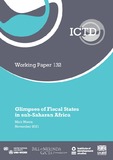| dc.contributor.author | Moore, Mick | |
| dc.date.accessioned | 2021-11-30T15:34:10Z | |
| dc.date.available | 2021-11-30T15:34:10Z | |
| dc.date.issued | 2021-10 | |
| dc.identifier.citation | Moore, M. (2021) Glimpses of Fiscal States in sub-Saharan Africa, ICTD Working Paper 132, Brighton: Institute of Development Studies, DOI: 10.19088/ICTD.2021.022 | en |
| dc.identifier.isbn | 978-1-78118-871-2 | |
| dc.identifier.uri | https://opendocs.ids.ac.uk/opendocs/handle/20.500.12413/16977 | |
| dc.description.abstract | There is a widespread perception that taxing in sub-Saharan Africa has been and remains fraught with problems or government failure. This is not generally true. For more than a century, colonial administrations and independent states have steadily developed the capacity to routinely collect more substantial revenues than one might expect in a low-income region.
The two main historical dimensions of this collection capacity were (a) powerful, centralized bureaucracies focused on achieving revenue collection targets and (b) large, taxable international trade sectors.
In recent decades, those centralized bureaucracies have to some extent been reformed such that in structure and procedure they resemble more closely tax administrations in OECD countries. More strikingly, nearly all states have adopted VAT and found it to be a very powerful revenue collection instrument.
However, the tax share of GDP has been broadly constant for several decades, and it will be hard to increase it. It is difficult for African governments to effectively tax transnational corporations, especially in the mining and energy sectors, which are of growing importance. Tax administrations continue to approach richer Africans with a light touch, and to exaggerate the potential for taxing small-scale (‘informal’) enterprises.
The revenue operations of sub-national governments are often opaque. Ordinary people often pay large sums in ‘informal taxes’ that are generally regressive in impact. And the standard direction of travel in the reform of tax policy and administration is not appropriate to those large areas, especially in the Sahel, that are afflicted by internal and cross-border armed conflicts. | en |
| dc.description.abstract | Please note: This study is reproduced here with full acknowledgement of UNU-WIDER, Helsinki. The study was originally commissioned under the UNU-WIDER project 'Fiscal states — the origins and developmental implications' and published as WIDER Working Paper 2021/151. | |
| dc.language.iso | en | en |
| dc.publisher | Institute of Development Studies | en |
| dc.relation.ispartofseries | ICTD Working Paper;132 | |
| dc.rights.uri | http://creativecommons.org/licenses/by-nc/4.0/ | en |
| dc.subject | Governance | en |
| dc.title | Glimpses of Fiscal States in Sub-Saharan Africa | en |
| dc.type | Other | en |
| dc.rights.holder | UNU Wider | en |
| dc.identifier.externaluri | https://www.wider.unu.edu/publication/glimpses-fiscal-states-sub-saharan-africa | en |
| dc.identifier.team | Governance | en |
| dc.identifier.doi | 10.19088/ICTD.2021.022 | |
| rioxxterms.funder | Default funder | en |
| rioxxterms.identifier.project | Default project | en |
| rioxxterms.version | VoR | en |
| rioxxterms.versionofrecord | 10.19088/ICTD.2021.022 | en |
| rioxxterms.funder.project | 9ce4e4dc-26e9-4d78-96e9-15e4dcac0642 | en |


